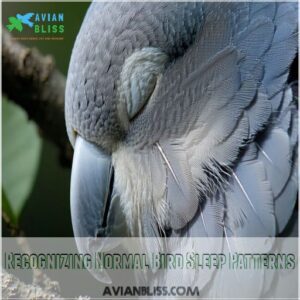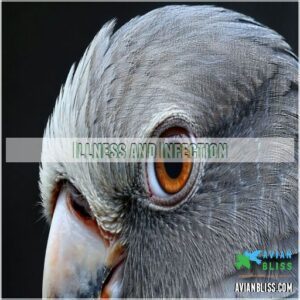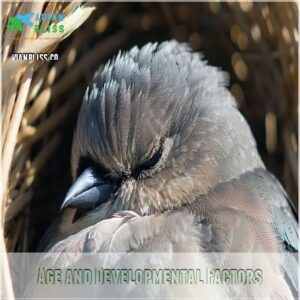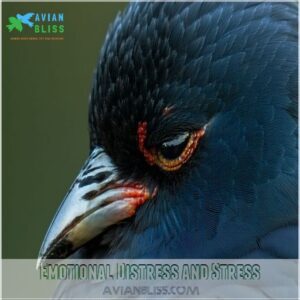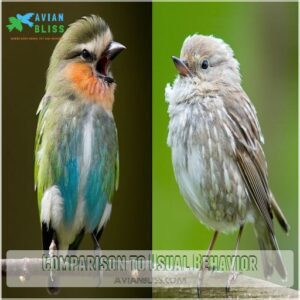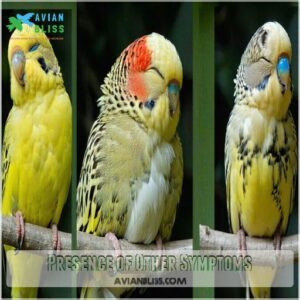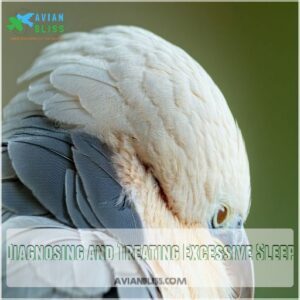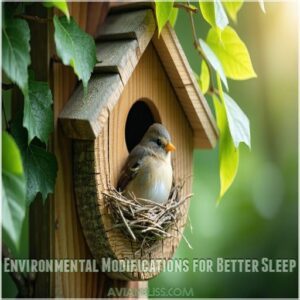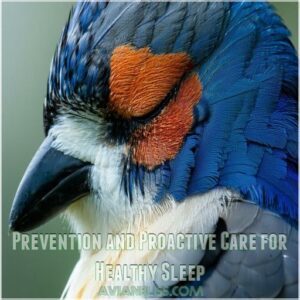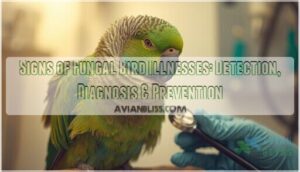This site is supported by our readers. We may earn a commission, at no cost to you, if you purchase through links.
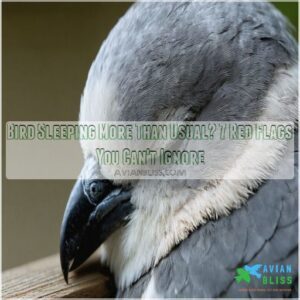
While most birds need 10-12 hours of daily sleep (like your favorite couch-potato cousin), excessive snoozing can signal underlying issues.
Common culprits include illness, nutritional deficiencies, or environmental stress – think of it as your feathered friend’s way of sending an SOS.
Watch for other warning signs: reduced appetite, lethargy, or changes in their usual chirpy personality.
Just like humans hitting the snooze button too often, your bird’s extra shut-eye might indicate they need a wellness check.
Understanding the subtle differences between normal bird sleep and concerning patterns can make all the difference.
Table Of Contents
- Key Takeaways
- Recognizing Normal Bird Sleep Patterns
- Causes of Excessive Sleep in Birds
- Identifying Excessive Sleep in Birds
- Diagnosing and Treating Excessive Sleep
- Environmental Modifications for Better Sleep
- Prevention and Proactive Care for Healthy Sleep
- Frequently Asked Questions (FAQs)
- Why do birds sleep so much?
- When do birds sleep?
- Do birds sleep more than humans?
- Can birds sleep while perched?
- Do baby birds sleep better than adult birds?
- What happens if a bird sleeps at night?
- Why is my bird sleeping more than usual?
- Is my bird sick or just sleepy?
- How to tell if a bird is sleeping or dead?
- Why is my bird always tired?
- Conclusion
Key Takeaways
- While birds normally need 10–12 hours of sleep daily, excessive sleeping combined with reduced appetite, lethargy, or personality changes warrants immediate veterinary attention.
- Your bird’s excessive sleep could stem from illness, nutritional deficiencies, environmental stress, or emotional distress—monitor their eating habits, activity levels, and overall behavior for clues.
- You’ll want to maintain proper temperature (65–80°F), humidity (40–50%), and lighting cycles (10–12 hours of darkness), while eliminating drafts and toxins from your bird’s environment.
- You can prevent sleep issues by providing a balanced diet, regular vet check-ups, consistent daily routines, and appropriate social interaction and mental stimulation.
Recognizing Normal Bird Sleep Patterns
You’ll find that most pet birds need 10-12 hours of quality sleep each day, though this amount can vary based on their species and individual needs.
When you’re monitoring your feathered friend’s sleep patterns, you’ll want to watch for their unique habits, including their preferred sleeping positions and tendency to take short power naps throughout the day.
Hours Required for Sleep
Ever wondered how much sleep your feathered friend really needs? Birds typically require 10-12 hours of daily rest, though this varies considerably by species and individual.
Your avian companion’s sleep needs depend on several factors:
- Smaller species like finches may need up to 12 hours
- Large parrots often require 10-11 hours
- Some exotic species might sleep up to 16 hours
This natural variation helps them maintain their high metabolism and supports important body functions.
Habits of Napping
Three distinct nap patterns mark a healthy bird’s daily routine.
You’ll notice short power naps lasting 10-15 minutes scattered throughout daylight hours, helping them recharge between activities.
These mini-breaks are perfectly normal, but timing matters – if your feathered friend’s napping schedule suddenly shifts or they’re dozing more frequently during peak activity hours, it’s worth paying attention. These mini-breaks are perfectly normal. napping schedule
Positions for Sleeping
While your feathered friend takes those power naps, their sleeping positions can tell you a lot about their comfort and health. Just like us choosing our favorite side of the bed, birds have their preferred sleep positions.
Recognizing these normal sleep patterns is key to understanding if your bird is just resting or showing signs of excessive sleepiness, which can be influenced by various factors, including daylight, noise, temperature, and routine, as seen in common bird sleep cycles.
- Head tucked under wing (conserves body heat)
- Standing on one leg (reduces energy loss)
- Gripping perch with both feet (maximum stability)
- Snuggled against cage bars (seeking security)
These natural positions indicate your bird’s feeling safe and cozy.
Variation by Species and Age
Did you know that your bird’s sleep needs can vary dramatically based on its species and age?
Young birds, like teenagers, need more shut-eye – up to 20 hours daily!
Meanwhile, adult parrots typically need 10-12 hours, though some species like cockatiels might snooze longer. Your bird’s individual personality plays a role too, just like how some people are early birds while others are night owls.
Causes of Excessive Sleep in Birds
If your feathered friend is catching more Z’s than usual, you’ll want to understand the five main causes that could be behind their excessive sleepiness.
From common health issues like infections to environmental factors such as room temperature,
identifying the root cause will help you get your bird back to their normal, energetic self.
Illness and Infection
Several health issues can make your feathered friend catch more Z’s than usual.
Beyond simple tiredness, excessive sleep often signals underlying infections – from respiratory problems to avian flu.
Bacterial infections, parasites, and fungal diseases can drain your bird’s energy, while viral illnesses might knock them out for extended periods. If you notice unusual sleeping patterns alongside other symptoms, it’s time for a vet visit. underlying infections and vet visit.
Age and Developmental Factors
Just as growing kids need more shut-eye, your bird’s age plays a key role in its sleep patterns.
Young birds typically snooze longer than adults – it’s nature’s way of supporting their rapid growth and development.
If you’ve got a senior feathered friend, don’t be surprised if they’re catching extra Z’s too. Like us, older birds often need additional rest to maintain their energy levels. Older birds and young birds sleep differently.
Nutritional Deficiencies and Malnutrition
Your feathered friend’s excessive sleepiness might be their body’s cry for better nutrition.
A diet lacking essential vitamins and minerals can drain their energy levels faster than a leaky battery.
Watch for decreased appetite, weak muscles, or dull feathers – these are telltale signs of nutritional gaps. Nutritional gaps can cause excessive sleepiness.
If you’re not supplementing with calcium, vitamin D3, or offering a varied diet, your bird’s drowsiness could be nutrition-related.
Environmental Factors and Toxins
While proper nutrition sets the foundation for your bird’s health, environmental factors can throw sleep patterns off balance.
Aerosol poisoning from household products is a significant threat to birds due to their sensitive respiratory systems, learn more about aerosol hazards for birds.
Watch out for toxic fumes from non-stick cookware, cleaning products, or air fresheners near their cage.
Poor air quality, inadequate ventilation, and even certain household plants can affect their rest.
Regular cage cleaning and choosing safe materials help maintain an environment where they’ll sleep soundly.
Emotional Distress and Stress
Birds, like us, experience emotional ups and downs that can disrupt their sleep patterns.
Stress triggers such as loud noises, routine changes, or unfamiliar visitors can send your feathered friend into excessive snoozing mode.
Common anxiety culprits include loneliness, boredom, or feeling threatened by nearby pets. Look for other signs like decreased appetite, feather plucking, or unusual quietness alongside increased sleep. Common anxiety culprits and stress triggers.
Identifying Excessive Sleep in Birds
You’ll need a keen eye to spot the difference between your bird’s normal snooze habits and concerning sleep patterns that signal health issues.
It’s natural for birds to take regular naps throughout the day.
You’ll want to watch for changes in their usual routine, especially when paired with other behavioral shifts. This is important to note for health issues.
Changes in Eating or Drinking Habits
Have you noticed changes in your feathered friend’s eating patterns alongside their excessive sleep? It’s important to monitor these key signs, as they often go hand-in-hand with sleep issues.
Here are three key warning signs to watch for:
- Sudden disinterest in favorite treats
- Leaving food bowls untouched for unusually long periods
- Dramatic changes in water consumption, whether increased or decreased
These changes warrant immediate veterinary attention.
Lethargy and Reduced Activity
Like a flickering candle losing its flame, lethargy in your feathered friend often signals deeper concerns.
You’ll notice your pet dragging its feet during playtime, showing less interest in toys, or barely mustering energy for daily activities.
Watch for signs like delayed responses to your voice, reduced wing flapping, or reluctance to climb or explore. These symptoms often indicate underlying health issues requiring immediate attention.
Comparison to Usual Behavior
A careful eye on your feathered friend’s daily rhythms can reveal subtle changes in their sleep patterns. Every bird has unique quirks and routines, just like we do.
When monitoring their behavior, watch for these key changes:
- Sleeping during usual playtime hours
- Missing their favorite activities or social interactions
- Skipping their regular morning or evening routines
These shifts from normal patterns deserve your attention.
Presence of Other Symptoms
Several warning signs might accompany your bird’s excessive sleep. Watch for changes in feather condition, unexplained weight loss, or respiratory issues.
Different types of discharge from eyes or nostrils can signal infection.
If you notice appetite changes alongside increased sleep, it’s time for a vet visit.
Don’t ignore behavioral shifts like reduced singing or interaction – they’re your bird’s way of saying something’s wrong.
Diagnosing and Treating Excessive Sleep
You’ll need a proper diagnosis from an avian veterinarian to determine why your feathered friend is catching extra Z’s, as excessive sleep can signal various health issues from simple fatigue to serious illness.
Your vet will conduct thorough testing, including blood work and physical exams, before creating a customized treatment plan that may include medications, dietary changes, or environmental adjustments.
Veterinary Examination and Testing
When your bird’s sleep patterns ring alarm bells, scheduling a thorough check-up with an avian specialist becomes your next smart move.
To find a reliable avian vet near you, consider searching online for local avian vet services.
They’ll piece together the puzzle through a series of tests: blood work reveals hidden health, fecal analysis spots lurking parasites, while X-rays and ultrasounds paint a clear picture of your feathered friend’s internal health.
Think of it as your bird’s full-body wellness scan.
Medication and Antiviral Treatment
After your vet’s thorough diagnosis, they’ll tailor medications to address your bird’s specific condition. Common treatments include antiviral drugs for avian influenza or antibiotics for bacterial infections.
Here’s what you should know about medication:
- Most antiviral treatments last 7-14 days, with strict dosage schedules
- Side effects might include reduced appetite or temporary drowsiness
- Drug interactions can occur with existing medications, so always inform your vet
Remember to complete the full course of prescribed medication, even if your feathered friend starts feeling better.
Nutritional Changes and Supplements
Beyond medication, proper nutrition forms the foundation of your bird’s recovery from sleep issues. A balanced diet paired with targeted supplements can restore your feathered friend’s energy levels.
| Supplement Type | Purpose | Dosage | Notes |
|---|---|---|---|
| Vitamin D3 | Calcium absorption | 2-3 drops daily | Direct sunlight helps |
| B-Complex | Energy boost | 1 drop/100g weight | Mix with fresh food |
| Calcium | Nerve function | As directed | Essential for laying hens |
| Probiotics | Gut health | 1/4 tsp daily | Better nutrient absorption |
Only introduce supplements under veterinary guidance—they’ll determine the right mix based on your bird’s specific needs.
Behavioral Therapy and Environmental Modifications
Behavioral therapy and environmental tweaks can work wonders for your sleepy bird.
Start by creating enrichment zones with different perches, toys, and activities that encourage natural behaviors.
Consider rearranging the cage layout to provide both stimulating play areas and quiet retreat spots. You’ll want to gradually introduce changes to avoid stress – think of it like redecorating your bird’s apartment, one corner at a time.
Environmental Modifications for Better Sleep
You’ll be surprised how much your bird’s sleep habits can improve with simple changes to their environment.
from adjusting room temperature to managing light exposure.
Just like you’d create the perfect bedroom for a good night’s rest, you can modify your feathered friend’s surroundings to guarantee they get the quality sleep they need. sleep habits
Suitable Temperature and Humidity
Temperature and humidity play pivotal roles in your bird’s sleep quality.
Maintain room temperature between 65-80°F (18-27°C), adjusting based on your bird’s species.
Tropical birds thrive at 40-50% humidity – think rainforest vibes. Too dry? Your feathered friend might get restless.
Monitor these conditions with a digital thermometer-hygrometer combo, placing it near the cage for accurate readings.
Elimination of Drafts and Toxins
Drafts and toxins can turn your bird’s cozy corner into a danger zone. Just like you’d check your home for air leaks, your feathered friend needs protection from sneaky drafts that could disrupt their sleep. To further minimize airborne toxins, consider investing in a bird safe air purifier that’s specifically designed for homes with birds.
- Hidden household cleaners can release fumes that make your bird drowsy
- Scented candles and air fresheners might be causing excessive sleepiness" is incorrect and changed to "Scented candles and air fresheners might be causing excessive sleepiness" is incorrect, changed to
- Non-stick cookware releases invisible toxins that affect your bird’s energy
Consider installing an air purifier and switching to bird-safe cleaning products to create a healthier sleep environment.
Proper Lighting and Photoperiod
Your bird’s natural rhythm depends on consistent light exposure.
Like clockwork, birds need 10-12 hours of darkness for quality sleep.
Set up UVB lighting that mimics natural daylight and maintain regular on/off times.
During winter months, you’ll want to adjust the lighting schedule gradually.
Watch out for sudden changes in light intensity – they can throw off your feathered friend’s internal clock.
Reducing Stress and Anxiety
Inside a bird’s world, stress and anxiety can turn peaceful slumber into restless nights.
Create quiet zones away from household chaos and consider safe spaces like covered corners where your feathered friend can retreat, much like birds in the wild often return to the same roosting spot fidelity.
Stick to consistent daily routines, avoiding sudden changes that might upset them.
Enrichment ideas like gentle music, interactive toys, and regular social interaction can help reduce anxiety naturally, promoting better sleep patterns.
Prevention and Proactive Care for Healthy Sleep
You’ll save yourself countless worries and vet bills by learning to spot sleep issues before they become serious problems.
While you can’t prevent every health challenge your feathered friend might face, you can substantially reduce risks by creating the right environment and sticking to a proactive care routine.
Maintaining a Balanced Diet
A well-fed bird is a well-rested bird.
Mix fresh veggies, fruits, and high-quality pellets to keep your feathered friend’s energy levels steady.
Don’t go overboard with treats – they’re like midnight snacks that can disrupt sleep patterns.
Keep that water dish full and fresh, and consider vet-approved supplements if needed.
Think of nutrition as your bird’s natural sleep aid.
Creating a Safe and Comfortable Environment
After setting up a balanced diet, it’s time to focus on the sleeping quarters.
A cozy cage setup starts with the right size – think of it as your bird’s personal sanctuary.
Position perches at varying heights, keeping them away from food and water dishes. Smart temperature control (65-80°F) and proper ventilation make all the difference.
Add safe toys near sleeping areas for comfort, but avoid overcrowding the space. Proper ventilation and temperature control are crucial.
Providing Social Interaction and Stimulation
Social interaction and enrichment are critical lifelines for birds, who thrive on daily mental stimulation to maintain healthy sleep patterns. Think of your feathered friend as a toddler who needs constant engagement to avoid boredom-induced drowsiness.
- Rotate interactive toys daily to keep their curiosity peaked
- Schedule 15-minute training sessions twice daily
- Create foraging games with hidden treats
- Consider adding a compatible bird companion
These activities don’t just prevent excessive sleeping – they’re essential for your bird’s emotional well-being and natural behavior development.
Regular Veterinary Check-Ups and Follow-Ups
Scheduling regular check-ups with your avian vet forms the backbone of preventative care for your feathered friend.
Here’s what to expect during these important visits:
| Preventative Measure | Why It Matters |
|---|---|
| Blood work screening | Early detection of health issues |
| Physical examination | Catches subtle changes in behavior |
| Weight monitoring | Tracks nutrition and metabolism |
| Sleep pattern review | Identifies potential stressors |
Don’t wait for obvious symptoms – regular check-ups help spot and address sleep issues before they become serious problems.
Frequently Asked Questions (FAQs)
Why do birds sleep so much?
Birds need 10-12 hours of sleep daily due to their high-energy lifestyle.
Their fast metabolism requires frequent rest periods to recharge.
Some species even sleep with one brain hemisphere awake for safety.
When do birds sleep?
Just like your daily routine, most birds follow nature’s clock, sleeping from dusk till dawn.
You’ll notice they catch short power naps during daylight hours too, keeping their energy levels high for daily activities.
Do birds sleep more than humans?
Most avian species need 10-12 hours of sleep daily, which is more than your typical 7-9 hours.
They’ll also take quick power naps throughout the day to keep their high-energy lifestyles going.
Can birds sleep while perched?
Like skilled acrobats on a high wire, your feathered friends can indeed sleep while perched.
Thanks to a specialized tendon in their legs that automatically locks their toes around the branch for security.
Do baby birds sleep better than adult birds?
Baby birds need substantially more sleep than adults – up to 20 hours daily – to support their rapid growth and brain development.
You’ll notice they’re most active during brief feeding periods throughout the day.
What happens if a bird sleeps at night?
Just as stars dance in the night sky, birds enter their natural sleep cycle when darkness falls.
You’ll find your feathered friend perching securely, often on one leg, while their metabolism slows for restoration.
Why is my bird sleeping more than usual?
Increased sleeping in your bird could signal illness, stress, or nutritional deficiencies.
Watch for changes in eating habits.
Contact a vet if you notice other symptoms like lethargy or decreased appetite.
Is my bird sick or just sleepy?
Excessive sleeping can signal illness or simple fatigue in birds.
Watch for other symptoms like reduced appetite, fluffed feathers, or lethargy.
If you’re concerned, it’s best to consult an avian veterinarian for proper diagnosis.
How to tell if a bird is sleeping or dead?
While people say birds of a feather flock together, they don’t all sleep alike.
Check for subtle chest movements, warmth, and muscle tone.
A sleeping bird’s feathers will feel warm and flexible, unlike a deceased one.
Why is my bird always tired?
Your bird’s constant tiredness could signal various issues.
From illness and nutritional deficiencies to stress or environmental factors.
Check their diet, habitat conditions, and schedule a vet visit for proper diagnosis.
Conclusion
Like a sentinel watching over their flock, you’re now equipped to spot when your bird is sleeping more than usual.
By understanding these warning signs and taking prompt action, you’re giving your feathered friend the best chance at a healthy, vibrant life.
Remember, birds are masters at hiding illness, so trust your instincts. If something seems off about their sleep patterns, don’t wait – reach out to your avian vet.
Your vigilance today guarantees many happy tomorrows together. prompt action

